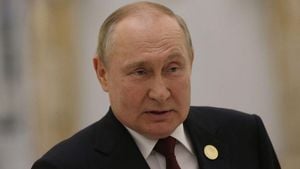The world is witnessing yet another tragic chapter as the Gaza War continues to wreak havoc, with children bearing the brunt of its devastating impact. These innocent lives have faced unimaginable suffering, with stories of survival and resilience surfacing amid the chaos.
The United Nations is raising alarm about the precarious situation for many children caught up in the violence. Francesca Albanese, the UN's Special Rapporteur for the Occupied Palestinian Territories, has spoken out about the dire circumstances, making her voice heard against what she characterizes as genocide. Albanese has faced significant backlash from pro-Israeli groups for her vocal stance, but she remains firm. Recently, she described the situation as akin to ethnic cleansing, urging for immediate action from the international community.
More than just numbers or reports, the lives of children affected by the Gaza conflict highlight the urgent need for humanitarian intervention. A notable case is the story of seven-year-old Halima Abou Yassine, who was gravely injured by Israeli airstrikes. Her family had been seeking refuge when tragedy struck; Halima’s injuries left her near death, with her skull cracked open. Fortunately, after significant efforts, she was brought to Lebanon for treatment as part of a program run by Dr. Ghassan Abu Sitta, who specializes in treating war injuries. This program has brought several severely wounded children from Gaza to Lebanon, where they can receive the care they desperately need.
After arriving, Halima's mother recalled the heart-wrenching moment they found her daughter lying on the street, her condition initially deemed fatal. Miraculously, after being assumed dead but later showing signs of life, Halima received care at Al-Aqsa Martyrs Hospital, where the overwhelming influx of wounded led to chaotic conditions. "It’s not uncommon for patients to be misidentified as dead due to the sheer number of cases coming from the violence," Abu Sitta explained. This chaotic environment often leads to heartbreaking misdiagnoses.
Leaders and activists worldwide are echoing calls for accountability and humanitarian aid, as the Israeli military's actions face intense scrutiny. Albanese’s assertion of genocide raises the banner for those fighting for Palestinian rights globally. Jewish activists like Stephen Kapos have praised Albanese’s courage and resilience, framing her as a hero among those who oppose the atrocities being committed.
Meanwhile, the situation for children continues to deteriorate. The stories coming from Gaza are bleak; hospitals overflow with casualties. The haunting images of destroyed neighborhoods and the cries of parents searching for lost loved ones paint the harrowing reality of life under constant threat. According to background reports, many children suffer not only physical wounds but deep psychological scars from their experiences. They are haunted by the sound of sirens, bombings, and the loss of family members, leading to long-term mental health issues.
More than 3,000 children have reportedly died since the onset of the current conflict, and many more have been injured. Analysts fear the long-term impact of such trauma could bend their lives toward violence, pushing them to become part of the conflict rather than breaking the terrible cycles of violence.
Halima, who experienced tragedy firsthand, now navigates the aftermath of her harrowing ordeal. After surgery to repair her skull, she is undergoing therapy to help her regain memories and cope with her trauma. Her recovery is hopeful, allowing her moments of happiness amid despair. Halima continues to enjoy simple joys like swimming and coloring, but the reality of her situation remains stark.
Lebanon, meanwhile, has become increasingly unsafe. The country has its own struggles, including rising tensions between Israel and Hezbollah, leading to fears of spillover violence. Initially, Halima and other wounded children were seen as needing simple treatments, but as the conflict escalated, the safety of all involved has come under threat.
Dr. Abu Sitta's choice to bring these children to Lebanon stems from his concern over the lack of medical resources available to them due to the conflict. Lebanon has experience accommodating severely injured patients from various conflicts, but the current escalation leaves both patients and medical personnel on high alert.
International calls to action are stepping up, seeking ways to provide support without placing additional stress on the local populations already dealing with the influx of wounded and refugees. The efforts to raise awareness about the plight of children like Halima highlight how interconnected global communities can be, and how many people hope for peace and recovery for everyone affected.
Through it all, the stories of these children act as stark reminders of the human cost of war. Each child bears dreams, hopes, and potential—potential disrupted by violence, loss, and trauma. The world watches, advocates press for change, yet the question remains: how many lives will be irrevocably changed before the world takes significant action to end the suffering?
The situation continues to unravel, but voices like Albanese’s remind us of the importance of holding those in power accountable and fighting for the rights of the voiceless. Every child who suffers is another story waiting to be told, urging the world to react, to care, and to act before it is too late.



